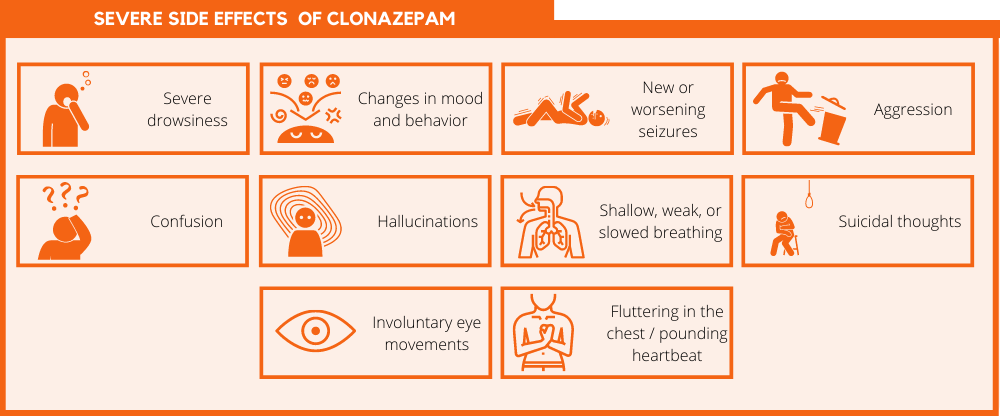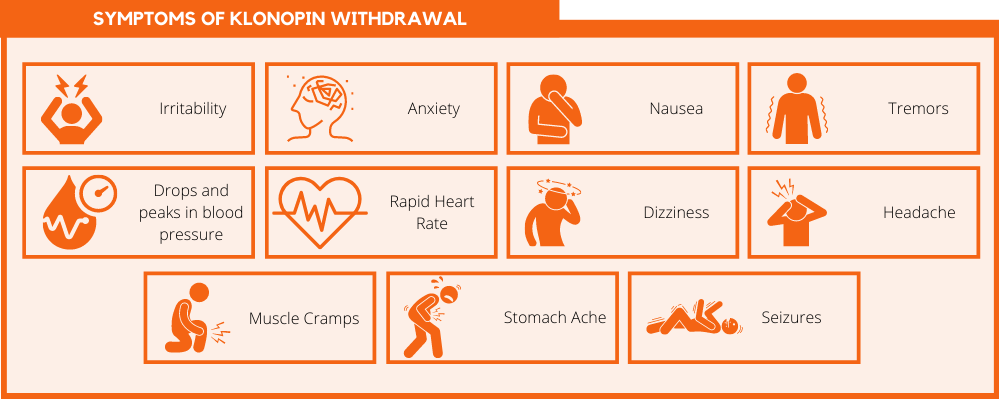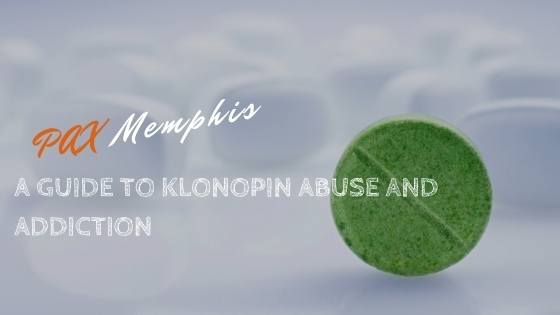Klonopin (clonazepam) is a highly addictive prescription benzodiazepine. Although it is prescribed to treat anxiety, panic attacks, and seizures, many people abuse this drug illicitly for its relaxing effects. Unfortunately, those who abuse this drug or take it for an extended amount of time may develop a physical dependence or addiction.
Klonopin addiction resembles any other benzodiazepine addiction in the way that it produces life-threatening withdrawal symptoms and often requires dual-diagnosis treatment.
What is Klonopin (Clonazepam)?
Clonazepam is a benzodiazepine medication that is sold under the brand name, Klonopin. Klonopin comes in three different doses: 0.5 mg, 1 mg, and 2 mg. This benzodiazepine is approved to treat panic disorder, agoraphobia, and some types of seizure disorders. It may also be used off-label to treat alcohol withdrawal.[1]
Klonopin is usually taken 2-3 times per day or as directed by a doctor. It works by calming brain waves and nerves to prevent panic attacks, seizures, and more. When abused, however, Klonopin addiction can be serious and life-threatening.
Like many other benzodiazepines, Klonopin is not intended for long-term use. Long-term Klonopin use can lead to physical dependence or addiction, causing some users to develop withdrawal symptoms when they try to stop taking the medication.
Klonopin Side Effects and Signs of Abuse


Klonopin may cause side effects, some of which can be serious. The most common side effects of clonazepam are:[2]
- Feeling tired
- Depression
- Drowsiness
- Dizziness
- Memory problems
- Lack of coordination or balance
Other more severe side effects that Klonopin may cause include:
- Severe drowsiness
- Changes in mood and behavior
- New or worsening seizures
- Aggression
- Confusion
- Hallucinations
- Shallow, weak, or slowed breathing
- Suicidal thoughts
- Involuntary eye movements
- Fluttering in the chest and/or a pounding heartbeat
These adverse side effects may be more apparent in people who are abusing Klonopin.
People who are abusing Klonopin will act as though they are under the influence of any other benzodiazepine, like Xanax or Valium. They may slur their words, have difficulty forming short-term memories, have glazed-over eyes, and move slowly. Their behaviors may also mimic those of alcohol intoxication as they may have slow reaction time, confusion, and impaired coordination.
Many people will abuse Klonopin by mixing it with alcohol or opioids. By combining two different central nervous system depressants, the effects are compounded, making people further inebriated. Mixing Klonopin with opioids or alcohol also significantly increases the risk of overdose.

Signs of a Klonopin overdose include:[2]
- Extreme drowsiness
- Unsteady walking
- Little to no attention span
- Lack of coordination
- Slowed breathing
- Pale or blue lips
- Loss of consciousness
Signs and Symptoms of Klonopin Addiction
Klonopin addiction begins when a person starts building a tolerance to the drug. Tolerance occurs when the body gets used to taking a certain dose of a substance and starts needing a higher dose to produce the same effects. This causes drug users to begin taking higher and higher doses of a drug to get high.
Tolerance causes people to take more and more of a drug, which then leads to physical dependence. Physical dependence occurs when the mind and body can no longer function normally without a certain substance. As a result, when users who are addicted to Klonopin stop taking the drug suddenly, they go into withdrawal.
Tolerance, dependence, and withdrawal are only three tell-tale signs of Klonopin abuse and addiction. Other signs that someone is addicted to Klonopin include:
- “Doctor shopping” or visiting multiple doctors to try and obtain multiple prescriptions
- Continuing to use Klonopin despite negative consequences happening in one’s life
- Wanting to quit and trying to quit but being unable to do so
- Lying to friends, family, and coworkers about drug use, well-being, or whereabouts
- Spending too much time or money obtaining, using, and recovering from the effects of Klonopin
- Having drug cravings when not using Klonopin
People who have become addicted to Klonopin will need to go to a medical detox and treatment center to get started on their recovery.
Klonopin Withdrawal and Detox

Suddenly stopping Klonopin once the body is physically dependent will result in one or more withdrawal symptoms. Symptoms of Klonopin withdrawal include:[3]
- Irritability
- Anxiety
- Nausea
- Tremors
- Drops and peaks in blood pressure
- Rapid heart rate
- Dizziness
- Headache
- Muscle cramps
- Stomach ache
- Seizures
Since Klonopin withdrawal is dangerous and can be life-threatening, people should never stop this medication without first speaking with their doctor or checking into a drug detox center.
If a person has become physically dependent on his or her medication, the doctor may prescribe a taper that gradually reduces the dose of Klonopin they take each day. The tapering method helps slowly wean people off of Klonopin so they don’t go into withdrawal.
Someone who is using Klonopin illegally and is struggling with addiction, however, should attend a medical detox program. During medical detox, doctors can prescribe long-acting benzodiazepines to help reduce the severity of withdrawal symptoms. They can also monitor patients around-the-clock and be prepared to intervene in the event of a medical emergency.
Treatment for Klonopin Addiction
After detox, which can last anywhere from a few days to a couple of weeks, patients are encouraged to attend inpatient or outpatient rehab. During rehab, patients can participate in a multitude of therapies and treatments that help them overcome their addiction.
Treatment will consist of both group and individual therapies that help patients understand the root causes of their addiction. Substance abuse counselors will also teach patients how to cope with their emotions without the use of drugs and alcohol.
Patients who struggle with dual diagnoses, such as panic disorder and addiction, can also get the help they need from an integrated treatment program that combines mental health care with addiction recovery.
Find Help Today
Klonopin addiction can make you feel scared, hopeless, and alone. Here at PAX Memphis, we’re here to tell you that you aren’t alone – there is a whole community of supportive and recovering individuals waiting to help you.
If you or someone you know is addicted to Klonopin, pick up the phone and call today to learn more about our treatment programs or for a risk-free consultation.
References:
Medically Reviewed: September 25, 2019

All of the information on this page has been reviewed and verified by a certified addiction professional.










